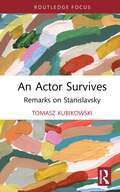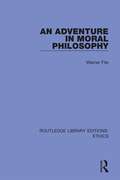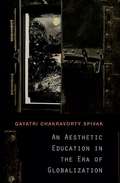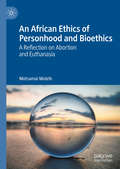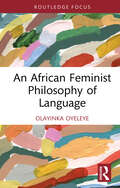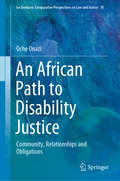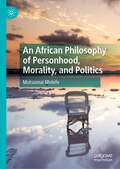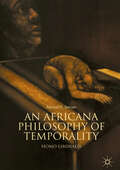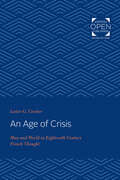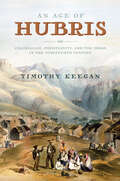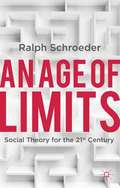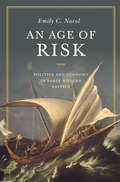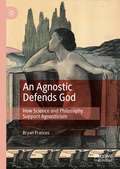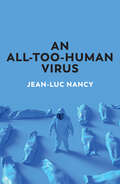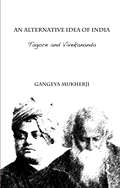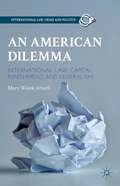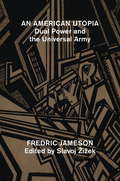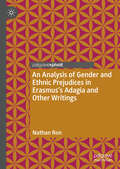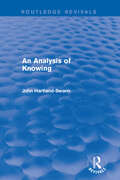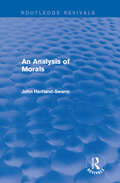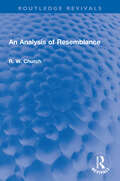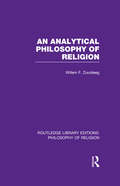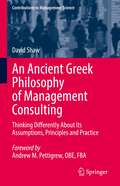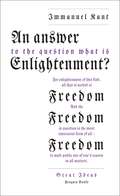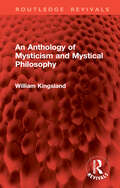- Table View
- List View
An Actor Survives: Remarks on Stanislavsky (Routledge Advances in Theatre & Performance Studies)
by Tomasz KubikowskiThis book focuses on the analysis and interpretation of the first volume of the book An Actor’s Work by Konstantin Stanislavsky. This volume is the only part of his planned major work on theatre art that he was able to finish and authorise before his death. Its highly edited variant has long been known as ‘An Actor Prepares’ in the English-speaking world. Tomasz Kubikowski explores Stanislavsky’s material not only as a handbook of acting but also as a philosophical testament of Stanislavsky, in which he attempts to contain his most essential experiences and reflections. This book explores the underlying theme of ‘survival’ in its various meanings, from professional to existential; and the mechanisms and actions we attempt to survive. This study will be of great interest to students and scholars in theatre and performance studies.
An Adventure In Moral Philosophy
by Warner FiteOriginally published in 1926, this book develops the Socratic thesis that morality is intelligence, that morality is not a matter of standards, laws and principles but in knowing what we do – in living self-consciously. The book develops this central theme in its bearings upon logic and science, art and religion and suggests that both intelligence and morality stand for much more than appears first obvious.
An Aesthetic Education in the Era of Globalization
by Gayatri Chakravorty SpivakDuring the past twenty years, the world s most renowned critical theorist the scholar who defined the field of postcolonial studies has experienced a radical reorientation in her thinking. Finding the neat polarities of tradition and modernity, colonial and postcolonial, no longer sufficient for interpreting the globalized present, she turns elsewhere to make her central argument: that aesthetic education is the last available instrument for implementing global justice and democracy. Spivak s unwillingness to sacrifice the ethical in the name of the aesthetic, or to sacrifice the aesthetic in grappling with the political, makes her task formidable. As she wrestles with these fraught relationships, she rewrites Friedrich Schiller s concept of play as double bind, reading Gregory Bateson with Gramsci as she negotiates Immanuel Kant, while in dialogue with her teacher Paul de Man. Among the concerns Spivak addresses is this: Are we ready to forfeit the wealth of the world s languages in the name of global communication? Even a good globalization (the failed dream of socialism) requires the uniformity which the diversity of mother-tongues must challenge, Spivak writes. The tower of Babel is our refuge. In essays on theory, translation, Marxism, gender, and world literature, and on writers such as Assia Djebar, J. M. Coetzee, and Rabindranath Tagore, Spivak argues for the social urgency of the humanities and renews the case for literary studies, imprisoned in the corporate university. Perhaps, she writes, the literary can still do something. "
An African Ethics of Personhood and Bioethics: A Reflection on Abortion and Euthanasia
by Motsamai MolefeThis book articulates an African conception of dignity in light of the salient axiological category of personhood in African cultures. The idea of personhood embodies a moral system for evaluating human lives exuding with virtue or ones that are morally excellent. This book argues that this idea of personhood embodies an under-explored conception of dignity, which accounts for it in terms of our capacity for the virtue of sympathy. It then proceeds to apply this personhood-based conception of dignity to bioethical questions, specifically, those of abortion and euthanasia. Regarding abortion, it concludes that it is impermissible since foetuses possess partial moral status. Regarding euthanasia, it argues that it is permissible for reasons revolving around avoiding the reversing of personhood. It also, though, minimally, touches on the questions regarding the mentally disabled and animals, to which it assigns lower moral status.
An African Feminist Philosophy of Language (ISSN)
by Olayinka OyeleyeThis book calls for the institution of an African feminist philosophy of language, challenging existing debates and encouraging a move away from the Western gaze.The book begins with an analysis of the philosophical context of African feminism, and a call for the decolonization of epistemological discourse. Oyeleye then goes on to consider how indigenous patriarchies play out in the cultural reality of the Yorùbá in particular, ontologically unpacking the nature of woman as expressed in language, especially in myths and proverbs. Challenging the derogatory language found in proverbs which entrench patriarchal oppression, the author advocates for feminist postproverbials: new proverbs which draw on old traditions but reconstruct the space of woman in a new, egalitarian rhetorical tradition. The author concludes by outlining the conditions necessary for African feminist philosophers to consider language as a decolonizing space which can help to push through the agenda of social change.This book will be an important resource for researchers from across the fields of gender and women studies, feminist philosophy, philosophy of language, cultural studies, and African studies.
An African Path to Disability Justice: Community, Relationships and Obligations (Ius Gentium: Comparative Perspectives on Law and Justice #78)
by Oche OnaziHow should disability justice be conceptualised, not by orthodox human rights or capabilities approaches, but by a legal philosophy that mirrors an African relational community ideal? This book develops the first comprehensive answer to this question through the contemporary literature on African philosophy, which is relied upon to construct a legal philosophy of disability justice comprising of ethical ideals of community, human relationships and obligations. From these ideals, an African legal philosophy of disability justice is offered as a criterion for critically evaluating existing laws, legal and political institutions, as well as providing an ethical basis for creating new ones to ensure that they are inclusive to people with disabilities. In taking an alternative perspective on the subject, the book outlines and emphasises the need for a new public culture of obligations owed to people with disabilities, highlighting both the prospects and difficulties of achieving the ideal of disability justice that continues to elude the lived experiences of millions of Africans today. Oche Onazi's An African Path to Disability Justice is the first book-length exploration of disability in the light of African ethics, as contrasted with the human rights and capabilities frameworks. Of particular interest are Onazi's thoughtful reflections on how various conceptions of community salient in African moral philosophy––including group-based, reciprocal and relational––bear on what we owe to the disabled. --Thaddeus Metz, Distinguished Professor, University of Johannesburg
An African Philosophy of Personhood, Morality, and Politics
by Motsamai MolefeThis book explores the salient ethical idea of personhood in African philosophy. It is a philosophical exposition that pursues the ethical and political consequences of the normative idea of personhood as a robust or even foundational ethical category. Personhood refers to the moral achievements of the moral agent usually captured in terms of a virtuous character, which have consequences for both morality and politics. The aim is not to argue for the plausibility of the ethical and political consequences of the idea of personhood. Rather, the book showcases some of the moral-political content and consequences of the account it presents.
An Africana Philosophy of Temporality: Homo Liminalis
by Michael E. SawyerThis book is a timely intervention in the areas of philosophy, history, and literature. As an exploration of the modern political order and its racial genealogy, it emerges at a moment when scholars and activists alike are wrestling with how to understand subject formation from the perspective of the subordinated rather than from dominant social and philosophical modes of thought. For Sawyer, studying the formation of racialized subjects requires a new imagining of marginalized subjects. Black subjectivity is not viewed from the static imaginings of social death, alienation, ongoing abjection, or as a confrontation with the treat of oblivion. Sawyer innovates the term "fractured temporality," conceptualizing Black subjects as moving within and across temporalities in transition, incorporated, yet excluded, marked with the social death of Atlantic slavery and the emergent political orders it etched, and still capable of exerting revolutionary force that acts upon, against, and through racial oppression.
An Age of Crisis: Man and World in Eighteenth Century French Thought (Goucher Colloquium)
by Lester G. CrockerOriginally published in 1959. This book examines the French Enlightenment by analyzing critical thought in eighteenth-centruy France. It examines the philosophes' views on evil, free will and determinism, and human nature. This is an interesting group to look at, according to Crocker, because French Enlightenment thinkers straddled two vastly different time periods.
An Age of Hubris: Colonialism, Christianity, and the Xhosa in the Nineteenth Century (Reconsiderations in Southern African History)
by Timothy KeeganAn Age of Hubris is the first comprehensive overview of the impact of missionary enterprise on the Xhosa chiefdoms of South Africa in the first half of the nineteenth century, chronicling a world punctuated by war and millenarian eruptions, and the steady encroachment of settler land hunger and colonial hegemony. With it, Timothy Keegan contributes new approaches to Xhosa history and, most important, a new dimension to the much-trodden but still vital topic of the impact—cultural, social, and political—of missionary activity among African peoples.The most significant historical works on the Xhosa have either become dated, foreground imperial-colonial history, or remain heavily theoretical in nature. In contrast, Keegan draws fruitfully on the rich Africanist comparative and anthropological literature now available, as well as extant primary sources, to foreground the Xhosa themselves in this crucial work. In so doing, he highlights the ways in which Africans utilized new ideas, resources, and practices to make sense of, react to, and resist the forces of colonial dispossession confronting them, emphasizing missionary frustration and African agency.
An Age of Limits: Social Theory for the 21st Century
by Ralph SchroederAn Age of Limits outlines a new social theory for understanding contemporary society. Providing an analysis of why political, economic and cultural powers face constraints across the global North and beyond, this bold book argues that forces which address current challenges must confront the limits of the interplay between dominant institutions.
An Age of Risk: Politics and Economy in Early Modern Britain
by Emily NacolIn An Age of Risk, Emily Nacol shows that risk, now treated as a permanent feature of our lives, did not always govern understandings of the future. Focusing on the epistemological, political, and economic writings of Thomas Hobbes, John Locke, David Hume, and Adam Smith, Nacol explains that in seventeenth- and eighteenth-century Britain, political and economic thinkers reimagined the future as a terrain of risk, characterized by probabilistic calculation, prediction, and control. In these early modern sources, Nacol contends, we see three crucial developments in thought on risk and politics. While early modern thinkers differentiated uncertainty about the future from probabilistic calculations of risk, they remained attentive to the ways uncertainty and risk remained in a conceptual tangle, a problem that constrained good decision making. They developed sophisticated theories of trust and credit as crucial background conditions for prudent risk-taking, and offered complex depictions of the relationships and behaviors that would make risk-taking more palatable. They also developed two narratives that persist in subsequent accounts of risk--risk as a threat to security, and risk as an opportunity for profit. Looking at how these narratives are entwined in early modern thought, Nacol locates the origins of our own ambivalence about risk-taking. By the end of the eighteenth century, she argues, a new type of political actor would emerge from this ambivalence, one who approached risk with fear rather than hope.By placing a fresh lens on early modern writing, An Age of Risk demonstrates how new and evolving orientations toward risk influenced approaches to politics and commerce that continue to this day.
An Agnostic Defends God: How Science and Philosophy Support Agnosticism
by Bryan FrancesThis book contains a unique perspective: that of a scientifically and philosophically educated agnostic who thinks there is impressive—if maddeningly hidden—evidence for the existence of God. Science and philosophy may have revealed the poverty of the familiar sources of evidence, but they generate their own partial defense of theism. Bryan Frances, a philosopher with a graduate degree in physics, judges the standard evidence for God’s existence to be awful. And yet, like many others with similar scientific and philosophical backgrounds, he argues that the usual reasons for atheism, such as the existence of suffering and success of science, are weak. In this book you will learn why so many people with scientific and philosophical credentials are agnostics (rather than atheists) despite judging all the usual evidence for theism to be fatally flawed.
An All-Too-Human Virus
by Jean-Luc NancyIn the past, pandemics were considered divine punishment, but we now understand the biological characteristics of viruses and we know they are spread through social interaction. What used to be divine has become human – all too human, as Nietzsche would say. But while the virus dispels the divine, we are discovering that living beings are more complex and harder to define than we had previously imagined, and also that political power is more complex than we may have thought. And this, argues Nancy, helps us to see why the term ‘biopolitics’ fails to grasp the conditions in which we now find ourselves. Life and politics challenge us together. Our scientific knowledge tells us that we are dependent only on our own technical power, but can we rely on technologies when knowledge itself includes uncertainties? If this is the case for technical power, it is much more so for political power, even when it presents itself as guided by objective data. The virus is a magnifying glass that reveals the contradictions, limitations and frailties of the human condition, calling into question as never before our stubborn belief in progress and our hubristic sense of our own indestructibility as a species.
An Alternative Idea of India: Tagore and Vivekananda
by Gangeya MukherjiThis book attempts to unravel the worldview of two prominent Indians of recent Indian history — Tagore and Vivekananda. Both suggested emancipation through political struggles but without transgressing the boundaries of humanism. This is significant, as identifying an enemy was an intrinsic part of nationalistic formulations. The larger philosophy of life, for Tagore and Vivekananda, was to reach out across geographical borders.In this work, their alternative idea of India is analysed in the larger context of the many formulations of nationalism with special reference(s) to theoretical as well as literary works in European and Indian contexts. The author brings on board critiques that have emerged recently —secularist, feminist and postcolonial — and defends his subjects against them. This book is essentially an intellectual interrogation of two eminent thinkers of their time, and falls within the rubric of intellectual history.
An American Dilemma
by Mary Welek AtwellAn American Dilemma examines the issue of capital punishment in the United States as it conflicts with the nation's obligations under the 1963 Vienna Convention on Consular Relations. In a number of high profile cases, foreign nationals have been executed after being denied their rights under the Vienna Convention. The International Court of Justice has ruled against the United States, but individual states have chosen to defy international law. The Supreme Court has not resolved the question of legal remedies for such breaches.
An American Utopia: Dual Power and the Universal Army
by Slavoj Zizek Fredric JamesonControversial manifesto by acclaimed cultural theorist debated by leading writers Fredric Jameson's pathbreaking essay "An American Utopia" radically questions standard leftist notions of what constitutes an emancipated society. Advocated here are--among other things--universal conscription, the full acknowledgment of envy and resentment as a fundamental challenge to any communist society, and the acceptance that the division between work and leisure cannot be overcome. To create a new world, we must first change the way we envision the world. Jameson's text is ideally placed to trigger a debate on the alternatives to global capitalism. In addition to Jameson's essay, the volume includes responses from philosophers and political and cultural analysts, as well as an epilogue from Jameson himself. Many will be appalled at what they will encounter in these pages--there will be blood! But perhaps one has to spill such (ideological) blood to give the Left a chance. Contributing are Kim Stanley Robinson, Jodi Dean, Saroj Giri, Agon Hamza, Kojin Karatani, Frank Ruda, Alberto Toscano, Kathi Weeks, and Slavoj i ek.From the Trade Paperback edition.
An Analysis of Gender and Ethnic Prejudices in Erasmus's Adagia and Other Writings
by Nathan RonThis book explores Erasmus's ethnic and gender prejudices. It does not in any way seek to undermine the esteem in which Erasmus is generally held, as a prince of the humanists; it is rather a consideration of common early modern prejudices. The book&’s principal innovation is the use of Erasmus&’s commentaries on thousands of Greek and Roman proverbs (his adagia) as a source for examining Erasmus&’s worldview. Researchers have often considered the adages as not voicing or reflecting Erasmus&’s views, and as such have chosen to ignore them. However, this book shows that Erasmus occasionally expresses his opinions through the adages, giving us an invaluable window into his worldview. An Analysis of Gender and Ethnic Prejudices in Erasmus's Adagia and Other Writings is essential reading for all scholars and researchers of early modern philosophy and intellectual history especially those researching the thought of Erasmus.
An Analysis of Knowing (Routledge Revivals)
by John Hartland-SwannFirst published in 1958, this book focuses on the meaning, interpretation, and use of the verb ‘to know’. In our daily lives we are often claiming to know this or not to know that; and it is not therefore surprising that the verb has played a major role in philosophical speculation from Plato down to Bertrand Russell. This book analyses the varying meanings of ‘know’ in its different operational roles: knowing Jones seems to have a different sort of logic from knowing French or from knowing what to do – and equally from knowing that the earth is round and from knowing how to read music. Knowing something is also different from merely believing it. The main purpose of this book is to elucidate, in a new and original way, this whole question of the logical behaviour of ‘know’; but its further and no less important purpose is to show how, once we have grasped the way in which certain key ‘know’-statements function, a number of philosophical disputes may be discussed more fruitfully and settled more expeditiously. Some of the analyses offered will be regarded as controversial and will undoubtedly provoke discussion. The style is lucid and economical and technical terms are reduced to a minimum. This work is intended not only for the professional philosopher and the university student, but also for the general reader who is interested in the methods of modern philosophical analysis.
An Analysis of Morals (Routledge Revivals)
by John Hartland-SwannFirst published in 1960, this book is intended to be a concise but complete treatise on Ethics. In the course of our lives we all face moral problems. Some of these we solve easily, some with difficulty and some not at all. It is the job of the moral philosopher to examine the general nature of these problems and to investigate their logical significance. His task however extends beyond investigating what are specifically moral problems; for he is concerned with the whole field of moral discourse – that is, with moral prescriptions and evaluations of all kinds. For this reason the branch of philosophy known as Ethics may usefully be defined as the study of the logic of moral discourse. This volume is written in clear and straightforward language and is liberally illustrated with practical examples. It should appeal, not only to teachers and students of Ethics in universities, but also to the general reader who is interested in seeing how an important branch of philosophy is presented with the aid of analytical methods.
An Analysis of Resemblance (Routledge Revivals)
by Ralph W. Church dec'dFirst published in 1952, An Analysis of Resemblance has two-fold aims. The opening chapters seek to present what it is not about. It is not concerned with any sense of resemblance in which that term is used by thinkers generally and widely called Hegelian Idealists. The several subsequent chapters of the work advance an analysis of four senses of resemblance. Two of these four senses would seem to be radical – in the etymological sense of the term. The other two senses are derivative. The concluding chapter advances some considerations as to the bearing of an analysis of resemblance on the matters of universals and taxonomy. Professor Church’s clearly stated ideas will arouse much discussion among students of philosophy. This book helps to round off his studies in this field and is a worthy successor to his earlier works.
An Analytical Philosophy of Religion (Routledge Library Editions: Philosophy of Religion)
by Willem Frederik ZuurdeegThis original study, published initially in 1959, introduces students of philosophy and of theology to a treatment of religion based upon the methods of modern philosophy – particularly logical empiricism and existentialism. Above and beyond the importance of its point of view, this book is distinguished by its clarity and by its objective and understanding presentation of diverse points of view.
An Ancient Greek Philosophy of Management Consulting: Thinking Differently About Its Assumptions, Principles and Practice (Contributions to Management Science)
by David ShawManagement consultancy practice is particularly concerned with helping clients implement strategic organisational change. But what exactly are organisations, and management consultancy interventions in them? Management consulting is said to be a knowledge-intensive industry. But what kind of knowledge do management consultants possess, and how far can we rely on it? Management consultants are often criticised for unethical exploitation of their clients. But how ought management consultants to behave in order to meet acceptable ethical standards? These are questions about the philosophical topics of ontology, epistemology and ethics. The ancient Greek philosophers thought deeply about these topics, and their ideas remain fresh and relevant even to so modern a subject matter as management consulting. Writing between the end of the sixth and the end of the fourth century BCE, these philosophers were drawing upon an intellectual tradition that was very different from our own, and were responding to social and economic conditions that were wholly unlike ours. Approaching these philosophical questions from a perspective that is radically different from our own, their work provides a rich resource for novel thinking about management consulting. From the speculations of the Presocratic philosophers Heraclitus, Parmenides, Leucippus and Democritus about the nature of the universe to the thought of Socrates, Plato and Aristotle about the nature of human beings, this book uses the work of these great thinkers as a lens through which to study major philosophical questions about management consulting. Examined in this way, many established assumptions and principles of management consultancy practice seem questionable, and new ways of thinking possible.
An Answer to the Question: 'What is Enlightenment?' (Penguin Great Ideas)
by Immanuel KantImmanuel Kant was one of the most influential philosophers in the whole of Europe, who changed Western thought with his examinations of reason and the nature of reality. In these writings he investigates human progress, civilization, morality and why, to be truly enlightened, we must all have the freedom and courage to use our own intellect. Throughout history, some books have changed the world. They have transformed the way we see ourselves - and each other. They have inspired debate, dissent, war and revolution. They have enlightened, outraged, provoked and comforted. They have enriched lives - and destroyed them. Now Penguin brings you the works of the great thinkers, pioneers, radicals and visionaries whose ideas shook civilization and helped make us who we are.
An Anthology of Mysticism and Mystical Philosophy (Routledge Revivals)
by William KingslandFirst published in 1927, An Anthology of Mysticism and Mystical Philosophy is a valuable contribution to the literature of mysticism in general, both in its theoretical and experimental aspects. It contains over seven hundred and fifty quotations from one hundred and fifty-eight ancient and modern mystical, philosophical, and scientific works. This book also acts as a supplement to William Kingsland’s previous volume Rational Mysticism for it is illustrative of the principles therein set forth.
